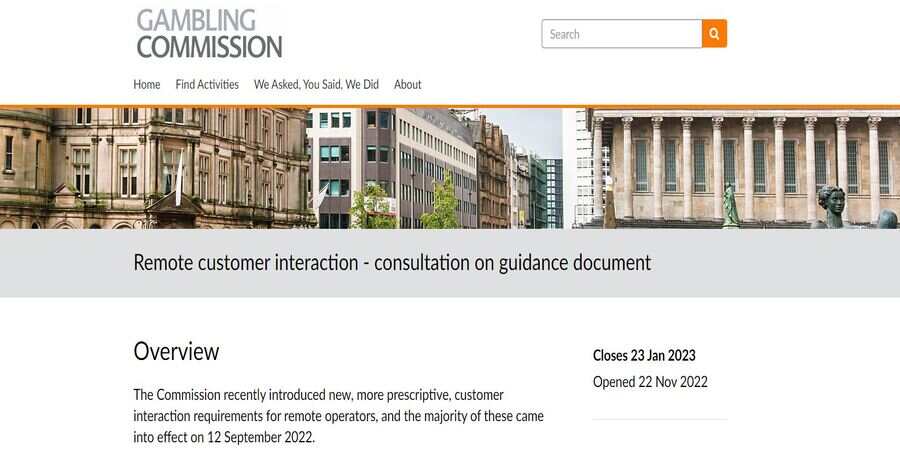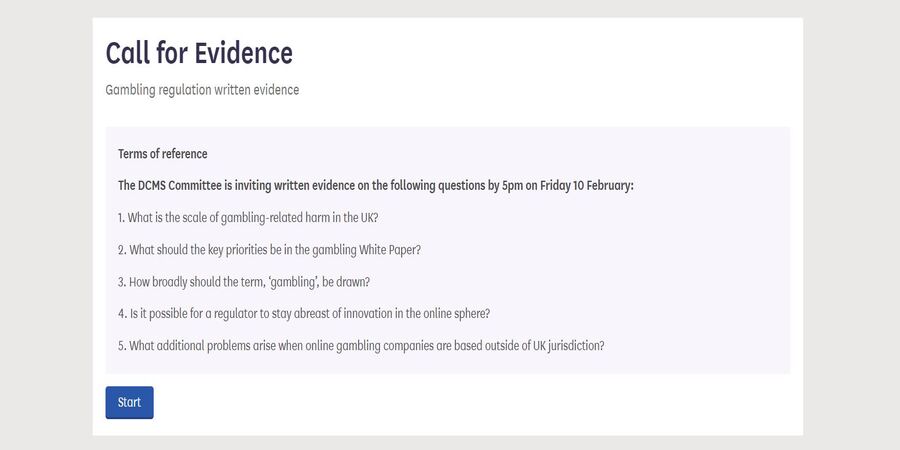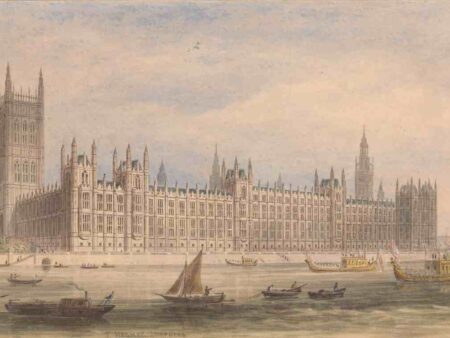By Jon Bryan | Expected reading time 5 mins
Last Updated: October 29, 2023

In light of two further consultations calling for views and experiences about gambling in the UK, Jon Bryan asks if the right questions are being asked.
Towards the end of last year, there were more signs that the government doesn’t know how to stop and conclude its seemingly never-ending review of UK gambling legislation. Paul Scully, the Minister responsible, continues with the line that the White Paper will be with us ‘in the coming weeks’ – a phrase that everyone associated with gambling heard too often for most of 2022. It is now a meaningless response which will soon celebrate its first birthday.
Two further calls for comments/evidence/contributions about gambling were announced as 2022 came to a close, leaving some people scratching their head about the purpose of continuing to ask some of the same questions.
MORE ‘ASKS’ FROM THE GOVERNMENT
At the end of November, a consultation from the Gambling Commission asked stakeholders about their experiences of the implementation of the new requirements for remote customer interaction. In some ways, this is a fairly understandable and routine set of requests for a government body to ask, but there were questions about the timing of all of this. For one thing, someone had to remind those organising the consultation that perhaps doing this over a period known as Christmas didn’t lend itself to a good response. As a consequence, the Commission extended the deadline until 23 January 2023. But questions about the Commission and this guidance were already being asked, as Dan Waugh from Regulus Partners reminded us in an article in the Racing Post, he wrote: ‘In September, the commission suspended its guidance for remote customer interactions just ten days before it was due to take effect, leaving licensees required to follow a set of non-existent guidelines.’

QUESTIONS ABOUT THE GAMBLING COMMISSION AND THE DCMS
Actions such as this from the Gambling Commission lend support to the idea that it is ‘not fit for purpose’, as the MP for Shipley, Philip Davies, has recently argued the Commission must ‘listen to the punters’ said Davies, arguing that the leaders of the Commission ‘know nothing about gambling’ and are ‘out of control’. This questioning of the Gambling Commission is becoming a little more widespread, and a series of articles and responses in the Racing Post have recently been published on this very issue. One punter spoke for many when he said that ‘the gambling regulator is part of the problem’.
Then, in December, the Digital, Culture, Media and Sport (DCMS) Select Committee launched an inquiry in the form of five very open-ended general questions with apparently no further detail or clarification. Various comments were made about this announcement, not least the strange timing, coming just before Christmas. The Betting and Gaming Council (BGC) welcomed the opportunity, BGC Chief Executive, Michael Dugher, saying that the Committee ‘has to strike a careful balance in making recommendations that are about protecting the vulnerable, whilst not unfairly impacting on the millions of customers who bet perfectly safely and responsibly’.

Others lampooned the idea of yet another consultation, as so many responses had already been submitted to the government during the official period of consultation for the gambling review. Caan Berry said he ‘Had to check this wasn’t a parody account’. When he saw the announcement, while Steve Ramsey said ‘One question that I feel and I am sure many others are puzzled about is why have you asked for this now? What is the reason the 16,000 responses already received have not fulfilled the original remit?’
With many senior figures in parliament preferring not to speak out and say what they really think on a number of issues, perhaps it is not surprising that the government continues to give off the appearance that they simply don’t know what to do about gambling.
It is debatable whether this focus on continued consultation is helpful. It could mean that policy is not just decided by those who shout the loudest, but by those who shout the most. Continually asking the same questions until you get the answers that you want – or the answers that might keep you in government – is not a good way of deciding what to do about a sensitive and important area like gambling regulation.
WHAT QUESTIONS SHOULD WE BE ASKING?
This begs the question – what should we be asking? Before I address that, I do encourage everyone reading this to contribute to the consultations mentioned above. The government and politicians need to hear from gamblers, as well as from those members of the public who have an interest in what is going on.
So what questions should be asked by those people who are considering reforming the gambling regulations in this country? I’ll pose three:
1. HOW DO WE IMPORVE THE EXPERIENCE OF THE CUSTOMER?
There are three different, but related, aspects to this question, but they are all associated with the experience of the gambling customer. Firstly, there are numerous examples of the gambling public complaining about being short-changed by gambling companies. One such example is a recent World Cup bet that was taken by Coral which attracted some publicity. Many seemed to side with the punter against the gambling company. Whatever the merits of this case, arguably, the punter gained more public support because of the way that this was handled, and the apparent lack of focus on the customer experience.

Secondly, there is mounting evidence about unwarranted restrictions being placed on betting accounts of individuals, or gamblers being asked to produce documents for no valid reason. Almost all of these seem to be checks and restrictions on winning punters, meaning that the focus is on the business and not the customer.
Thirdly, there are examples where it is apparent that gambling harm has taken place, where the operator could and should have intervened. There have been fines issued in a number of cases, which you can find on the Gambling Commission website.
There are plenty of things that we can discuss about these cases, but I think it would be difficult for anyone to say that the customer has been well served in all of these examples.
In summary, unnecessary intervention for one reason, and non-intervention for another, could be reduced if the focus was on customer satisfaction, rather than anything else. Losing is part of the risk of gambling, but no-one likes feeling ripped off, or completely being taken advantage of. That’s why I believe that how to improve the experience of the customer needs to be at the heart of any changes that the government introduces.
2. WHAT MESSAGE DOES THE IMPLIMENTATION OF THIS ACT/RULE/REGULATION SEND TO THE REST OF SOCIETY?
Those who follow the debate about gambling will know that there are questions about some fairly controversial areas where policy is being considered. This includes the banning of adverts, sponsorship and marketing, or restricting these activities so that gambling can neither be seen or heard. Another area is around the idea of affordability checks – a limit on what you can spend your money on. Too often, the focus of discussions around these ideas have a qualifier on them by those promoting such an approach. This is often along the lines of: “We are only doing this for gambling”.
There needs to be some recognition that implementing bans and restrictions in one area of life, usually leads to clampdowns and censorship elsewhere. This is why ideas and policies that are discussed in relation to gambling, should not be seen in isolation. Consideration needs to be given as to what message is being sent by implementing such a change, and where does this path lead us.
3. WHAT DOES THE DATA TELL US ABOUT GAMBLING AND GAMBLING HARM?
We are continually told that the gambling review is to be “evidence-led”. Too often we hear challenges to official statistics on gambling harm which are clearly motivated by something other than a search for the truth. ‘That can’t be true’, is no substitute for proper data collection and scrutiny. And we’re hearing more about the way that some data is being presented as fact, when the modelling, collection and presentation is dubious, to say the least.
Dan Waugh looked at this in some detail last year arguing that: ‘Evidence presented by all parties to the debate on the future of our gambling laws should be subjected to rigorous assessment and not accepted uncritically for the sake of convenience.’ He went on to warn us that ‘Failure to do so will likely lead to legislative incoherence, unintended negative consequences and ultimately the need to go through the process all over again’. I have argued before that ‘the prevention or minimisation of harmful gambling is important and complex work, requiring an appreciation that many millions of consumers gain enjoyment from gambling, and that ill-considered attempts to address problems can in themselves be harmful.’ Making changes on the basis of dubious data is not a good way of making new gambling regulations.
ASK THE RIGHT QUESTIONS
I pose these three questions as ones to think about when it comes to the issue about gambling and new gambling legislation. If we ask these questions, and make points about them to those who are prepared to listen, then who knows, perhaps the conclusion to this review of gambling might be one which actually makes some sense. We can but hope.
Jon Bryan is a Gambling Writer and Poker Player. His new pamphlet “Risking It All: The freedom to gamble” is now available to purchase and free to download. Follow him on Twitter @JonBryanPoker.







